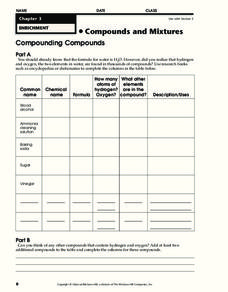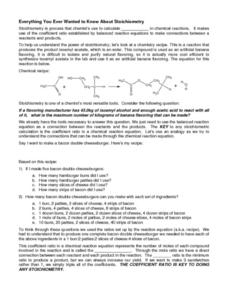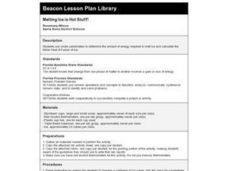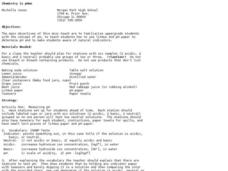Curated OER
Compounds
In this chemistry worksheet, students complete a chart about common compounds. Examples include baking soda, sugar, and wood alcohol.
Curated OER
Cross-Linked Polymer Lab
High schoolers use short-chain polymers and borate ions to produce cross-linked polymers in the lab. For this cross-linked polymer lesson plan, students produce polyvinyl acetate slime and polyvinyl alcohol slime and test their physical...
Curated OER
Indicators For Acids and Bases
Fourth graders compare the color of cabbage water when acids and bases are mixed in. In this acids and bases lesson plan, 4th graders use cabbage water and mix in acids and bases that the teacher prepares before hand. They observe the...
Curated OER
The Frigid Gourmet
Students make a " science surprise" or ice cream in the lab. For this melting point depression lesson plan, students use various substances with ice to determine the effects on the melting point of ice and the ability to make ice cream....
Curated OER
IUPAC Rules for Naming Compounds with Functional Groups
In this naming compounds with functional groups worksheet, students read about using the IUPAC rules for naming these compounds and they draw structures for 3 -carbon, 2-carbon and 4-carbon molecules and give the names for each.
Curated OER
More Acid-Base Indicators
Young scholars explore acids, bases, and indicators. They use turmeric solution, phenolphthalein, and goldenrod paper to determine the acidity and basicity of a variety of common household substances. A worksheet is included to record...
Curated OER
Everything You Ever Wanted to Know About Stoichiometry
In this chemistry worksheet, students identify the process of Stoichiometry and use it to calculate various chemical reactions similar to that of a recipe. In addition, they identify a connection between isoamyl alcohol and the product...
Curated OER
Melting Ice is Hot Stuff!
Fourth graders determine the amount of energy required to melt ice using a calorimeter. They calculate the Molar Heat of Fusion of Ice.
Curated OER
Substance Abuse
Students identify and define the symptoms of differently forms or substance and self abuse. They formulate opinions as to why people engage in these types of behaviors. Students create an action plan to help an individual who may be...
Curated OER
Making Soap
Students explore what chemical indicators are and use pH paper to determine if something is alkaline or basic. In this pH lesson students manufacture their own soap.
Curated OER
Density Lessons and the Oil Spill
Teachers can use the oil spill cleanup efforts as a springboard to discussions and activities related to density!
Curated OER
A Comparison of Polymeric Liquids with Newtonian Liquids
Students concretely illustrate and define a macromolecule, observe the unique behavior of polymers and relate to their knowledge of molecules, and use the scientific process to determine the difference between Newtonian and non-Newtonian...
Curated OER
States of Matter
Students discuss a given set of questions based on Chemistry and matter and review a glossary of terms. They conduct experiments on each state of matter: "Dry ice and water, Dry ice and soap and Dry ice and Isopropyl Alcohol." and...
Curated OER
The Effects of "Recreational" Drugs on the Development of Chick Embryos as a Model for Human Embryogenesis
Students conduct experiments on fertilized chicken embryos to determine the possible developmental effects that various recreational drugs (caffeine, alcohol, nicotine, and aspirin) might have on them.
Curated OER
Liquid Conductors
Students identify liquids as conductors. In this circuits lesson, students build a circuit, then use various liquids to complete the circuit, and determine which liquids successfully conduct electricity.
Curated OER
Radioactivity-What is the Nucleus Like?
In this radioactivity instructional activity, students answer 40 questions about half life, isotopes, radioactive decay, the uses of radioactivity, nuclear equations and the scientists associated with radioactivity.
Curated OER
Ice
Students examine the different propereties of ice, such as freezing temperature. In this scientific lesson students complete several activities using ice, like making ice cream.
Curated OER
Organic Chemistry Reactions
In this organic chemistry reactions worksheet, students are given a table with 8 different types of reactions that occur with organic molecules. Students answer 3 questions about the reactions given in the table and indicate which...
Curated OER
Substance Abuse Prevention
Young scholars evaluate the impact of substance use and abuse in society and the workplace. They identify support services in the workplace which deal with substance abuse. They create an "ideal" policy statement governing substance...
Curated OER
Drugs: Prevention Tips
Students use the Internet to examine ways they can prevent using drugs. They discover the dangers of these substances and complete online quizzes.
Curated OER
Anatomy and Physiology "Quickies"
Students use a variety of creative writing tools within this assignment: poems on particular organ systems, write a short story and/or create a word graph. They are involved in a demonstration of lactic build up in the muscles, a...
Curated OER
WS 4.7 Writing Chemical Reactions
In this chemical reactions activity, students are given fourteen chemical reactions that they must write using chemical formulas for the reactants and products. They balance each equation by placing the proper coefficients in front of...
Curated OER
Filling Up
In this filling up worksheet, high schoolers calculate the E85 per gasoline-gallon equivalent price to the E85 price per gallon to complete a chart of "alternative fuel". They use the data along with the price per gallon of gasoline to...
Curated OER
Chemistry is pHun
Students investigate the pH of solutions and they learn how to use different types of indicators. In this pH lesson plan, students test various solutions with pH paper and determine if they are acidic, basic or neutral. They also test...

























